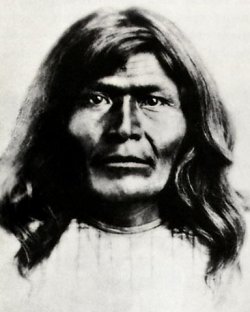

Victorio, born sometime in the 1820s conflicts, grew up in an era of escalating conflicts between Apaches, Mexicans, and American settlers. That he did not declare war on the whites until 1879 is proof of his leadership and integrity. Victorio's efforts as leader of his people were conciliatory until the end. He co-operated with U.S. agents and the military, but he did not associate with them.
Victorio made it a practice to remain beyond reach until the way was safe. He might remain aloof on a mountaintop until he was very sure. Never was Victorio a lounger around the agency or military posts. He remained apart, ever vigilant, wary, even when nominally at peace. He could not be surprised . . . No white man knew him well, although many made contact with him frequently."
Officers who fought in Victorio's War stated that he "displayed great military genius." Major Andrew Jackson McGonnigle ( who fought in the Civil War, and subsequently with both Sioux and Apache) "considered Victorio the greatest Indian general who ever appeared on the American continent."
Victorio was an able general, and was also greatly loved by his own people. Early in 1880 he was wounded in the leg during a fight which took place on the east side of the Black Range, not far from Ojo Caliente. The party of scouts, led by H.K. Parker, cut down the Apaches in a deadly crossfire. Parker called to the women to come out of the Apache camp, so as not to be hurt. The women replied that they would stay with Victorio because if he died, "they would eat him, so that no white man should see his body."
Victorio's life is one to be pondered from the point of view of the culture which he personified. His decision to go to war came after many years of astute leadership in the face of white encroachment and racism. It came after the news that their Warm Springs Reservation would be taken from them. Some say what finally goaded him to war was a warrant for his arrest sworn out in Grant County, New Mexico. That warrant would have been issued in Silver City.
His declaration of war would destroy what was left of the Mimbres Apaches. The war lasted one year, threw the Southwest into chaos and alarm, and ended on a rocky hillside in Mexico in the fall of 1880. Victorio, caught by Mexican militia, out of ammunition, died in battle. A Tarahumara Indian claimed to have fired the killing bullet. Victorio's people, who survived in captivity in Mexico, claimed Victorio took his own life, with a knife in the gut.
